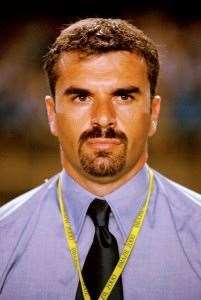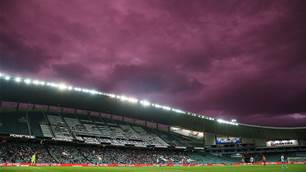Any soccer coach knows he lives or dies by his results. But Ange Postecoglou knows it better than most.
 Photo by Getty Images
Photo by Getty ImagesIt was the football equivalent of a public execution. For 12 excruciating minutes, Ange Postecoglou endured hostile demands for his resignation on national television from “Mr Football” Les Murray and former Socceroo cum high-profile analyst Craig Foster.
It was 2006 and Australia had failed to reach the 2007 FIFA World Youth Cup via our much-heralded new Asian pathway. Linked up to the Sydney hosts from SBS television’s Melbourne studios, Postecoglou, Australia’s then-national youth coach, was the subject of what he later described as an “ambush”.
It is famous television footage in the Australian soccer community (and easily found on YouTube). Postecoglou attempted to reason with them: the football landscape in Australia had led to a generation of players bereft of the necessary technical and physical ability to compete on the world stage. When the National Soccer League had closed up shop back in April 2004, its youth league had gone under with it. While the A-League revolution had kicked-off in August 2005, any kind of corresponding youth competition had failed to materialise (until three years later), leaving a generation of players short of quality match experience and subsequent fitness.
“Okay Ange,” Foster rebuked, “but that’s the second time you’ve failed to qualify now. You can’t just point to the players. You’ve got to take responsibility yourself, don’t you?”
Postecoglou shot back. “I’m not pointing to the players, Fozzie. Did you hear what I just said? Am I pointing to the players?”
The debate degenerated when Postecoglou picked up his fellow former Socceroo on some of his erroneous comments. “This is what annoys me. If you’re going to be critical of me, that’s fine. Do your research, have a look at the results and get it right. You say we lost to Laos: we drew nil-all. And have you seen what Laos’ results were in the main qualifying Asian series?”
 Photo by Getty Images
Photo by Getty ImagesFoster had not. As it happened, the south-east Asian nation had been disqualified for the use of over-age players.
Postecoglou continued. “As far as my coaching quality, I’d love you to come down to a coaching session, mate, because in the six years I’ve been in charge I haven’t seen you ... As a professional media analyst why don’t you go to the effort of making sure your research is right and go to the effort of maybe coming to a practice session instead of sitting a million miles away?”
“Listen, you’re not paid to win training sessions,” Foster replied angrily. “You’re paid to qualify these teams through Asia! I watched them against China and they were rubbish!”
In fact, the coach gave as good as he got, barely flinching under the barrage. But in the courtroom of public opinion, it was one of the final nails in the Victorian’s coaching coffin. Within months the youth boss was given the bullet from the position. At the time it appeared that the “Sydney media mafia” had got their man.
“I’m not proud of that episode and I didn’t like the way it represented our game and it certainly didn’t represent me in a good light,” says Postecoglou now, some eight years on and having completed a triumphant return to the top job in Australia as Socceroos boss. “I had a big stint [as national youth coach] and certainly learnt a lot and was ready for the next challenge, but I guess in many ways my whole tenure got defined by that incident. It was unsavoury because it didn’t put anyone in a good light, but I certainly moved on from that pretty quickly and since then, apart from people bringing it up, it hasn’t really affected me.”
 Brisbane Roar captain Matt McKay and Ange celebrate back-to-back titles in 2011. Photo by Getty Images
Brisbane Roar captain Matt McKay and Ange celebrate back-to-back titles in 2011. Photo by Getty ImagesThe story of how this Greek-born, Melbourne-made manager clawed his way back is one of belief, determination and grit – character traits clearly on display in that fiery exchange.
********
IT WAS ONLY INJURY that brought Ange Postecoglou’s 193-game playing career to an abrupt halt at age 28. But to all who knew him it was only a matter of time before he would be making the tough decisions on the sidelines. Postecoglou had “future coach” written all over him throughout his playing days. He moved straight into a position at state league level in 1996; within 12 months he was in the coveted head coaching role at his beloved South Melbourne. But it was a successful rookie stint that almost never came about.
Legend has it that after collecting just one competition point from his first five games at the helm, the notoriously ruthless South board had already made the decision to give its favourite son the chop. It was only the absence of the president at a Thursday night training session that spared the fledgling gaffer ... A win the following weekend, followed by a charmed run all the way to the penultimate weekend of the season, laid the foundations for one colourful coaching journey.
Postecoglou might give an impression of amiability and reason, but right from the start he demonstrated he had the ability to make the hard calls. One former Socceroo who knows this all too well is Mike Petersen. Being a good friend on and off the park and a championship team-mate didn’t protect the one-time Ajax Amsterdam man from the axe at South. “Ange took over as coach when he was only 31,” Petersen explains. “One of the first things he did was tap me on the shoulder. It was emotional, as I thought I had something in the tank, but I appreciated his honesty.
“Ange was always mature beyond his age. He was skipper at South Melbourne when he was only 21 or 22 years old. He’d won a championship at 19; he was a great student of the game. On the road most of us would blow off steam at bars and clubs, but that kind of thing was never for him. He led us to great success both as a player and a coach.”
In terms of influences, Postecoglou points to a pair of his South Melbourne bosses having a profound effect on him as a player and future coach: Ferenc Puskas and Frank Arok. The late Puskas was a Hungarian international and Real Madrid star widely regarded as one of the greatest players of all time; in educated football circles he is mentioned in the same breath as Pele, Maradona and Eusebio, having netted 84 times in 85 starts for his country in an era when Hungary was a football heavyweight. He served as South Melbourne boss from 1989 to 1992. “From Puskas I learned how to be a better human being more than anything else,” says Postecoglou. “He was the most humble and respectful person I’d ever come across in the game. With his CV, it could’ve very well been the other way.”
But after his dumping from the national youth role, Postecoglou’s humility and respect was sorely tested, as he began the task of not just restoring his damaged football reputation, but simply earning a living. After consulting with several clubs at state league level, Postecoglou landed at Football Federation Victoria in 2007, charged with revolutionising the state’s elite junior set-up. “I had been with the national youth team travelling the world and being exposed to the best players and the best coaches at the under-20 and under-17 level and liaising with some of the biggest names in the game,” says Postecoglou. “It was a unique insight for me – I saw that as my PhD in coaching. It was challenging but I was in awe at the same time.”
 FFA CEO David Gallop (L), chairman Frank Lowy and Ange ink the deal in 2013 that just might save the Socceroos. Photo by Getty Images
FFA CEO David Gallop (L), chairman Frank Lowy and Ange ink the deal in 2013 that just might save the Socceroos. Photo by Getty ImagesHis role at state level was a serious comedown, but with Postecoglou now persona non grata to the top end of the soccer town, he had to take what coaching chances came his way. Arriving at the Victorian federation’s headquarters, where this scribe was working as the organisation’s communications manager, it was apparent the former youth boss was still smarting. Though accessible to media for the most part, the new man flatly refused requests to speak to SBS. The wounds were simply too raw.
This was a four-time NSL champion (twice as a player, twice as manager) so obviously destined for the big time, licking his wounds in a small shop running on the smell of an oily rag. He had spent the last six years criss-crossing the globe; now a road trip to Shepparton was more likely than a sojourn to Sao Paulo.
But after years of under-performing at national level, Victoria was seeking a new elite youth set-up and Postecoglou was the man charged with the task of reinventing the development wheel. Though he at times struggled to hide his bemusement at his new station in life, he put his PhD into practice. Within months, the “V>Elite” was born, a system aimed at bringing together the cream of the state’s youngsters from ages as young as ten. It replaced a structure where any kid with parents willing to pay significant fees was allowed to be part of the elite pathway merry-go-round. V>Elite sharply and suddenly narrowed the talent pool, allowing for greater focus on technique and tactics.
Postecoglou’s baby was unashamedly elitist and targeted at onfield results, which offended many who take a more touchy-feely approach to junior sport. But the tide turned almost immediately. Soon the Big V was winning titles again and the first brick in the restoration of Postecoglou’s reputation was cemented. Shortly after, he went close to landing at Adelaide United as a replacement to John Kosmina after the club’s infamous 6-0 grand final drubbing to Melbourne Victory, but that job fell to Aurelio Vidmar. Staring into the void of soccer oblivion, Postecoglou did the unexpected in March 2008, returning to the land of his birth to manage in that country’s third division. At the invitation of club owner Con Makris, once described as “the richest Greek in Australia”, Postecoglou joined Panachaiki, based in the Mediterranean nation’s third-largest city of Patras.
“It was challenging,” explains Postecoglou diplomatically. “You were dealing with things you’d never deal with in Australia, no matter how long you coached here. Nothing here could prepare you for it, nothing replicates it, not even in the top-line sports like AFL or NRL.
“Just being in a European football country where everyone was so passionate about the team – it was a lot more tribal. They weren’t too fussed about having nice grounds, and pitches and conditions; they just wanted to win.”
If his time in charge of the Young Socceroos and Joeys was his PhD, Postecoglou’s time in Greece was the muck-in, extra-curricular hard labour assignment that rounded out his football CV. “What I learned was dealing with players with a different mentality,” he recalls. “I’d coached in Australia my whole career and could get frustrated with players lacking basic technique. Even in the third-division in Greece you had players with great technique, but perhaps lacking that typically Australian competitive spirit ... So you learned to talk to players in a different way.”
 It was only a matter of time till South Melbourne's 2000 mentor would reach the top. Photo by Getty Images
It was only a matter of time till South Melbourne's 2000 mentor would reach the top. Photo by Getty ImagesHaving spent a lifetime in Australia being branded as a “Greek”, Postecoglou found himself an outsider once more: “It helped that I could speak the language fairly well, and I could get across what I wanted to, but I was always seen as a foreigner even though I was born there, which I was at pains to point out to them. I was always labelled ‘the Australian coach Ange Postecoglou’.”
While Athens and Thessaloniki, the nation’s two biggest cities, boasted multiple clubs in the top-flight Super League, Panachaiki was a club that had suffered a decade in the wilderness, but would still regularly draw crowds in excess of 10,000. The pressure was immense. “There were four daily newspapers in a city of 600,000 people, and they all read them. Each paper had three pages dedicated to the club daily, covering things like who scored in five-a-side at training and what I was up to ... It was just ridiculous. As a coach I was constantly under scrutiny; I joked that it was the kind of place where the coach doesn’t get to put their initials on the training kits because they’re changing managers four times a year.”
Sure enough, Postecoglou’s homecoming of sorts was over shortly into his second season and a return to Australia soon followed. Postecoglou remained the “sacked coach” until April 2009, when the call of Victorian Premier League outfit Whittlesea Zebras was answered ... Postecoglou can never claim he doesn’t like a challenge. Whittlesea sat bottom of the table, without a point from its opening six games. Relegation beckoned. Despite a rich history linking back to Brunswick Juventus in the NSL, the team rarely attracted more than a few hundred fans to games and a dispute over the club’s home ground at Epping Stadium saw it living a nomadic existence. If ever there was a job designed to restore your coaching stocks, this wasn’t it.
There followed a series of victories, on and off the park, as Postecoglou turned around a toxic culture. But as Foster had told him on national television years before, he wasn't being “paid to win training sessions”, and by late July the Zebras were officially condemned to Victoria’s second tier. This was Postecoglou’s darkest hour – and it is where the cliche about it being darkest before the dawn rings true.
Within months – October 14, 2009 to be precise – Postecolou was appointed coach of Brisbane Roar, replacing Frank Farina after his contract was torn up for a second drink-driving offence. “I’ll be forever grateful for the opportunity,” reflects Postecoglou. But before he would transform Brisbane into any kind of sporting powerhouse, there was a house to get in order first. Postecoglou instantly laid down the law amongst a squad in revolt, especially in the senior ranks. Star players Charlie Miller and Liam Reddy were shown the door and veteran national team man Danny Tiatto was marginalised. Socceroo Craig Moore offered the club’s board a “he goes, or I go” ultimatum. The new manager didn’t blink, and neither did the club’s executive. See ya, Craig.
“It was an easy decision to make,” part-owner Emmanuel Drivas told The Courier-Mail at the time. “We believed in one thing. In a team, everything comes from the top and in this situation the top was the coach. We employed Postecoglou to run the whole team.”
The rest is, as they say, history. Despite a lacklustre inaugural season where Brisbane finished second-bottom, Postecoglou’s first full campaign in charge in 2009-10, with his own hand-picked squad on the park, was a smashing success. The Roar claimed both minor premiership and championship honours, garnering a reputation not just for winning, but particularly the manner in which it was achieved. En route to its crowning grand final glory in front of 50,000 adoring fans at Suncorp Stadium, the club went on a 28-game unbeaten run and was soon coined “Roar-celona” for its liberated attacking style.
Back-to-back titles 12 months later reinforced Postecoglou’s rags to riches status, before a triumphant homecoming to Melbourne Victory in April 2012. But it was his move to Australia’s top job late last year that completed the fairytale. For now.
********
ONE ON ONE, Ange Postecoglou isn’t the kind of guy who lights up the room. He’s more Wayne Bennett than Kevin Sheedy. But like both of them, he’s a coach for life.
“If the Brisbane job hadn’t turned up, I probably would have moved overseas again,” he says. “But there certainly were times I questioned if a top-line opportunity would ever come again.”
The breaks have eventually come, and Postecoglou has thrived. In his own way, one-time critic Foster has even become a supporter. But the coming 12 months may well play out as deja vu all over again, given the potential booby-traps that lie ahead at June’s FIFA World Cup and the AFC Asian Cup on home soil just six months later. Make no mistake: with Spain, the Netherlands and Chile in our group, Australia has drawn the shortest of straws for Brazil 2014.
Postecoglou doesn’t even try to sugar-coat what lies ahead and the initial shock of FIFA’s World Cup draw. “We had a brief before we walked into the room in Brazil, and we were told there is likely to be cameras on us, so let’s make sure we don’t say ‘oh shit’ as the draw does come out,” he explains. “But it was very hard for me to hold myself back a little bit.”
Despite possessing a five-year contract, Postecoglou might have been given a poisoned chalice, but he’s still giving it everything he’s got. “From my perspective, time is of the essence between now and the World Cup, so I’ve got to use every spare moment well.” This is evidenced by the fact the national gaffer remains domiciled in Melbourne, despite the sport’s HQ being in Sydney. The reason? There simply isn’t time to relocate. All energies must be focused on Brazil.
 Photo by Getty Images
Photo by Getty ImagesWith his head still spinning from the appointment, Postecoglou had something akin to a week-long first date with his charges during last November’s friendly with Costa Rica in Sydney. “The Costa Rica game was one where I had to really make sure my senses were sharp and pick up all the information I needed to make sure I made the changes I required between that game and the next time we are together.”
It’s the huge change from the daily interaction of the club environment to the isolation of the national team that poses a significant test for Postecoglou. According to veteran Australian coach Branko Culina – who most recently enjoyed stints with Sydney FC and Newcastle Jets – that might be easier said than done. “There are limitations with this squad and that’s the biggest challenge,” says Culina. “Everyone talks about Ange wanting to play an attractive brand of football with an emphasis on entertaining. That’s not going to be the case with the squad he’s got and at this level. The challenge is going to be if Ange can come up with a plan to be able to get the best out of this squad. This is not Brisbane Roar, and he is not coaching Spain or Brazil.”
But the last word on whether or not Postecoglou’s Socceroos will thrive perhaps belongs to the coach’s son. “He sent me a text within 30 seconds of the World Cup draw coming out and it read; ‘Dad, now you have a chance to become a legend.’
“I guess that’s the Aussie way of thinking,” laughs the Socceroos boss. “It’s an opportunity for us to create some history, so let’s get cracking.”
Related Articles

Matildas star Raso leaves Real Madrid for Tottenham

Postecoglou hails positive transfer window for Spurs













